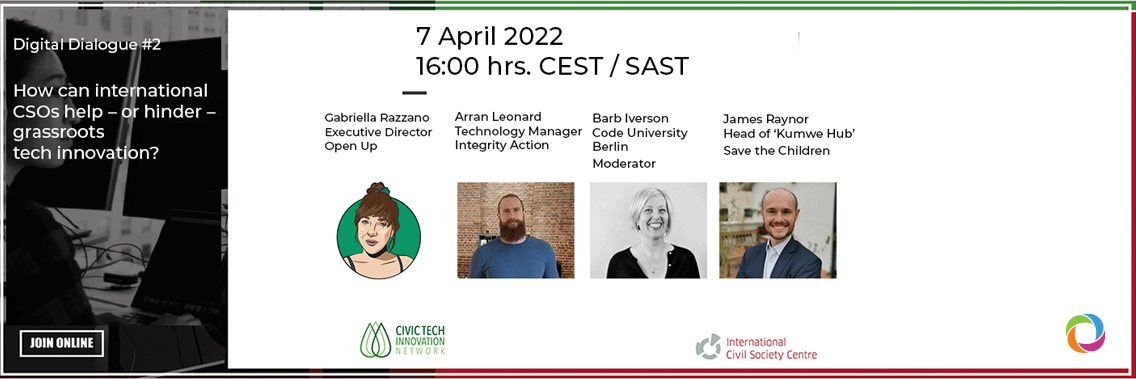📅 7 April 2022 🕟 4 PM- 5 PM (CEST)
Virtual
How can international CSOs help – or hinder – grassroots tech innovation?
The global reach of international civil society organisations (ICSOs) allows these organizations to develop, scale out and tailor innovative approaches and novel use of technology across borders and in different countries and settings. They may also have sufficient resources to influence the policies, operational and resourcing environments for the development and adoption of innovation and technology in some national contexts. While pursuing their own broad digital innovation and transformation strategy, they invest in their operations and internal functions, and data management.
These organisations operate with technological partners and outsource the development and maintenance of specific digital functions. Data is often stored and processed by commercial partners. There are ICSOs investing in start-ups. At the same time, there is considerable digital innovation from grassroots groups, civic tech networks, local NGOs, and social enterprises, generating effective data and digital solutions and new ideas for using tech for social good in the areas and with the communities, they support and represent. Initiatives that demonstrate proven impact and innovation can attract interest for wider applicability and replication, beyond the operational or resourcing mandates and constraints of where it originated.
These two streams of innovation described so far, ICSO lead and grass-roots driven technological advancement may meet under certain circumstances. This has led in the context of sector conversations around advancing locally-led development, to some interesting questions on the role of ICSOs in effectively, ethically, and equitably supporting and scaling digital grassroots innovators/innovations. In theory, there is little doubt that support from international CSOs could impact resourcing, influencing and scaling. However, it is also conceivable that the financial and political might of ICSOs could stifle grass-roots led innovation.
The Panel
- Barb Iverson, Code University Berlin, Moderator
- Arran Leonard, Technology Manager, Integrity Action
- Gabriella Razzano, Executive Director, Open Up
- James Raynor, Head of Kumwe Hub, Kumwe Hub
The panel will discuss how equitable and ethical partnerships should look like, so as to avoid risks of potential co-option or takeover of these grassroots innovations. It is the already known question of power dynamics around resources, talent, ideas which is now being played out in the area of digital tool development and innovation.
- What are promising models of work, ensuring ethical, equitable, and effective collaboration for digital innovation – accelerator models, challenge models, complementary advocacy, etc.?
- Are the best practice examples of ICSOs working effectively with grassroots tech innovators/innovations, including a solution to the question who owns or represents such tech innovations?
- What are the opportunities and possible barriers to replicate this kind of collaboration?
- Deliberate on concepts such as ‘open source’ and ‘open data’ and how it impacts grass-roots initiatives
The dialogue will allow grassroots innovators to describe their point of view, exploring the possible added value of ICSOs to accelerate, scale out or deepen the impact their technological solutions, and to highlight both the opportunities and risks of such a collaboration.

